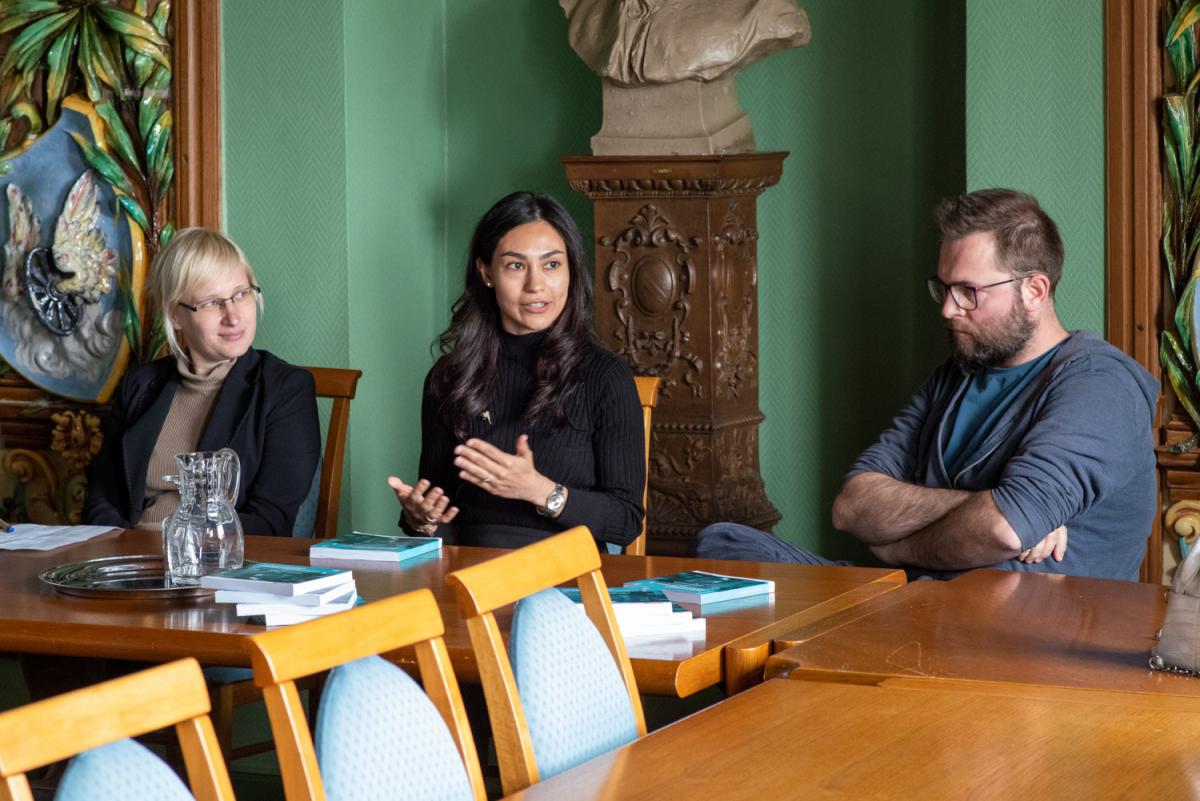 On 28th April, the NEWSREEL2 project and the Pécs Academic Committee organized a book launching event to introduce the book with the title of 'New Skills for Journalists: Comparative perspectives from Europe'. The volume, which was published by the Transylvanian Museum Society, contains the most important research results of the NEWSREEL & NEWSREEL2 project.
On 28th April, the NEWSREEL2 project and the Pécs Academic Committee organized a book launching event to introduce the book with the title of 'New Skills for Journalists: Comparative perspectives from Europe'. The volume, which was published by the Transylvanian Museum Society, contains the most important research results of the NEWSREEL & NEWSREEL2 project.
The programme started with a presentation by Annamária Torbó, professional leader of the NEWSREEL2 project. In her twenty-minutes speech she gave an overview of the project, especially the developed project materials.
The next programme point was a round-table discussion led by Petra Szávai (PhD candidate of the University of Pécs). Annamária Torbó and Gyula Maksa took part in the discussion as editors and authors, while Rita Glózer as an author of the book. First of all, all of the participants shared their involvement in the NEWSREEL project and introduced their specific field of research: ethical challenges of the digital public sphere, graphic journalism and storytelling in social media. After that, all of them received some field specific questions.
Annamária Torbó talked about how the ethical challenges are integrated into the everyday work of journalists. She also mentioned some good reactions for these difficulties from the side of journalism training, such as special courses based on the materials developed in the first NEWSREEL project, which are available at the Uniersity of Pécs and at the Eötvös Loránd University. As she highlighted, Hungary is in a special situation, because there are no independent journalism majors in the higher educational institutions, as the authors also underlined this in the book. These form of knowledge and skills are still integrated into the Communcation and Media Studies programmes.
Rita Glózer focused on how newsrooms exploit social media opportunities in their dissemination of news, and surprisingly she mentioned a public service broadcaster, the German ARD as a best practice example. Gyula Maksa presented what forms comics journalism can take in the given countries and what genre and narratological differences can be identified. At the end of the section, the lecturers told the audience how they applied the outcomes of the research in their teaching materials.
The members of the second round-table were journalists working for different newsrooms. Eszter Katus is an investigative journalist working for Átlátszó, a watchdog NGO and the first non-profit centre for Investigative journalism in Hungary. She shared some details why it is challenging to become a journalist when there are no independent journalism programmes at the universities. Ervin Güth works for Telex, one of the biggest news portal in Hungary and he also takes care of his newsletter, called 'mecseki müzli'. In these pieces, he focuses on the most important issues connected to Pécs on a weekly basis. Özge Çakır-Somlyai is a PhD student at the ELTE and also works as a journalist for 'The European Correspondent' which is a brand new initiative with the aim of focusing on European journalism with the help of more than 150 journalist from different European countries. She informs the public both on Hungarian and Turkish events.
The participant journalists identified the most important problems that can be threatening for all type of journalism. According to Ervin Güth, the fields of the NEWSREEL project and the developed materials are very useful, but he can see many problems that are more deeply rooted. The journalists also mentioned the opportunites and dangers of AI, which is one of the hot topics in the current media landscape. Although most of the researchers concentrate more on the negative effects, these chatbots also have some advantages regarding the everyday work of journalists. For example, they can offer opprtunities in the case of giving a title to an article.
The participating lecturers and journalists came to the conclusion that there are still many aspects that need to be changed in the profession of journalism, especially in Hungary. This is also true for journalism training, but initiatives like the NEWSREEL2 project and discussions like these round table discussions can be a good start.